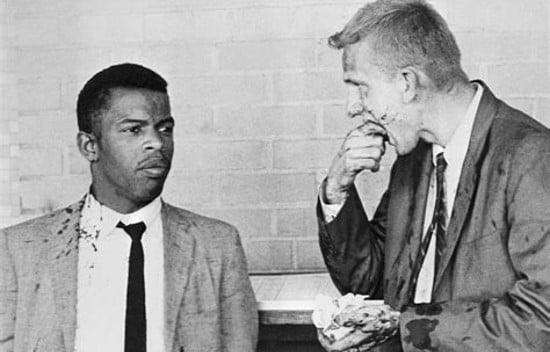This is grim reading, but it’s a clear-eyed look at what “competitive authoritarianism” entails. This is the form of quasi-democratic, quasi-freedom experienced under the growing form of dictator-ish regimes that have emerged in many countries after the end of the Cold War — and that the U.S. is racing toward right now. Here is a taste from Steven Levitsky and Lucan A. Wray’s Foreign Affairs piece, “The Path to American Authoritarianism“:
Competitive authoritarianism—a system in which parties compete in elections but the incumbent’s abuse of power tilts the playing field against the opposition. Most autocracies that have emerged since the end of the Cold War fall into this category, including Alberto Fujimori’s Peru, Hugo Chávez’s Venezuela, and contemporary El Salvador, Hungary, India, Tunisia, and Turkey. Under competitive authoritarianism, the formal architecture of democracy, including multiparty elections, remains intact. Opposition forces are legal and aboveground, and they contest seriously for power. Elections are often fiercely contested battles in which incumbents have to sweat it out. And once in a while, incumbents lose, as they did in Malaysia in 2018 and in Poland in 2023. But the system is not democratic, because incumbents rig the game by deploying the machinery of government to attack opponents and co-opt critics. Competition is real but unfair.
Competitive authoritarianism will transform political life in the United States. As Trump’s early flurry of dubiously constitutional executive orders made clear, the cost of public opposition will rise considerably: Democratic Party donors may be targeted by the IRS; businesses that fund civil rights groups may face heightened tax and legal scrutiny or find their ventures stymied by regulators. Critical media outlets will likely confront costly defamation suits or other legal actions as well as retaliatory policies against their parent companies. Americans will still be able to oppose the government, but opposition will be harder and riskier, leading many elites and citizens to decide that the fight is not worth it. A failure to resist, however, could pave the way for authoritarian entrenchment—with grave and enduring consequences for global democracy.
Again, this is both very grim and very real. But it’s also not unprecedented right here in the U.S. of A. The “real but unfair” existence of stacked-deck democracy and the weaponization of every government office against opposition is exactly what non-white Americans lived with and lived through for most of the 20th century. The Trump/Musk effort to railroad the country into “competitive authoritarianism” is, essentially, an attempt to create a MAGA-version of Jim Crow.

“Most autocracies that have emerged since the end of the Cold War fall into this category,” Levitsky and Wray argue. But this is also what “democracy” looked like in much of America before the beginning of the Cold War — before the Civil Rights Movement briefly forced America to begin treating the Reconstruction Amendments as actual, meaningful law and its theoretical protections began, haltingly — and temporarily — to be applied to all of its citizens more equally.
The explicitly segregationist and patriarchal “anti-DEI” fever shows that this new Jim Crow will include most of the features of the original — with similar implications for the original targets. But it will also be expanded to restrict and punish — to “bind, but not protect” — others based on their willingness to demonstrate fealty and obsequious loyalty.
The flagrant corruption of this new Jim Crow — the revival of the spoils system and overt kickbacks for exemptions from targeting, from harassment, from selective enforcement, from tariffs, etc. — isn’t really a new feature either. Economic corruption was also a foundation of the original system.
The parallel here isn’t exact in every detail, but it’s close enough to shape our forecast and expectations. And also close enough to shape our response and to allow us to learn how to resist, overcome, and overthrow this latest revision of an unjust, evil, sad system.
Understanding that history is grounds for hope. It shows that resistance is possible, and that it can succeed. But this is a daunting hope — a reminder that resistance and success are neither easy nor guaranteed.
The grade-school version of the Civil Rights Movement — now forbidden to be discussed in grade schools — makes it seem simple and inevitable. Rosa Parks sat on a bus, Martin Luther King Jr. gave some speeches, there were a few big protest marches, and then voila — equal protection, equality, and civil rights for all. But all of those steps were the product of years of planning and organizing — decades of work involving tens of thousands of people organizing locally. This recent BlueSky thread describes it well. The Civil Rights Movement:
… was not a sudden uprising of marches and actions, resulting in quick change. It was a carefully built machine, with test cases, trials, and planning. Extensive, intensive planning and training. Leaders weren’t magical negroes, born fully equipped to battle racism. They were cultivated, educated, and hardened to withstand fire hoses, dogs, and violence, and to use their voices with careful force.
It was disciplined work, plain and simple, not impulse and scattershot fury.
It was not quick. Whether you take voting rights, desegregation, or something else as your starting point, the Civil Rights Movement began the second slaves were freed. It took one hundred years to coalesce into the movement we studied, however briefly, in school.
Preventing, or beating back the new “American Authoritarianism” will not be a sprint. It will not be quick or easy. But it also will not be joyless, hopeless, or unrewarding.













